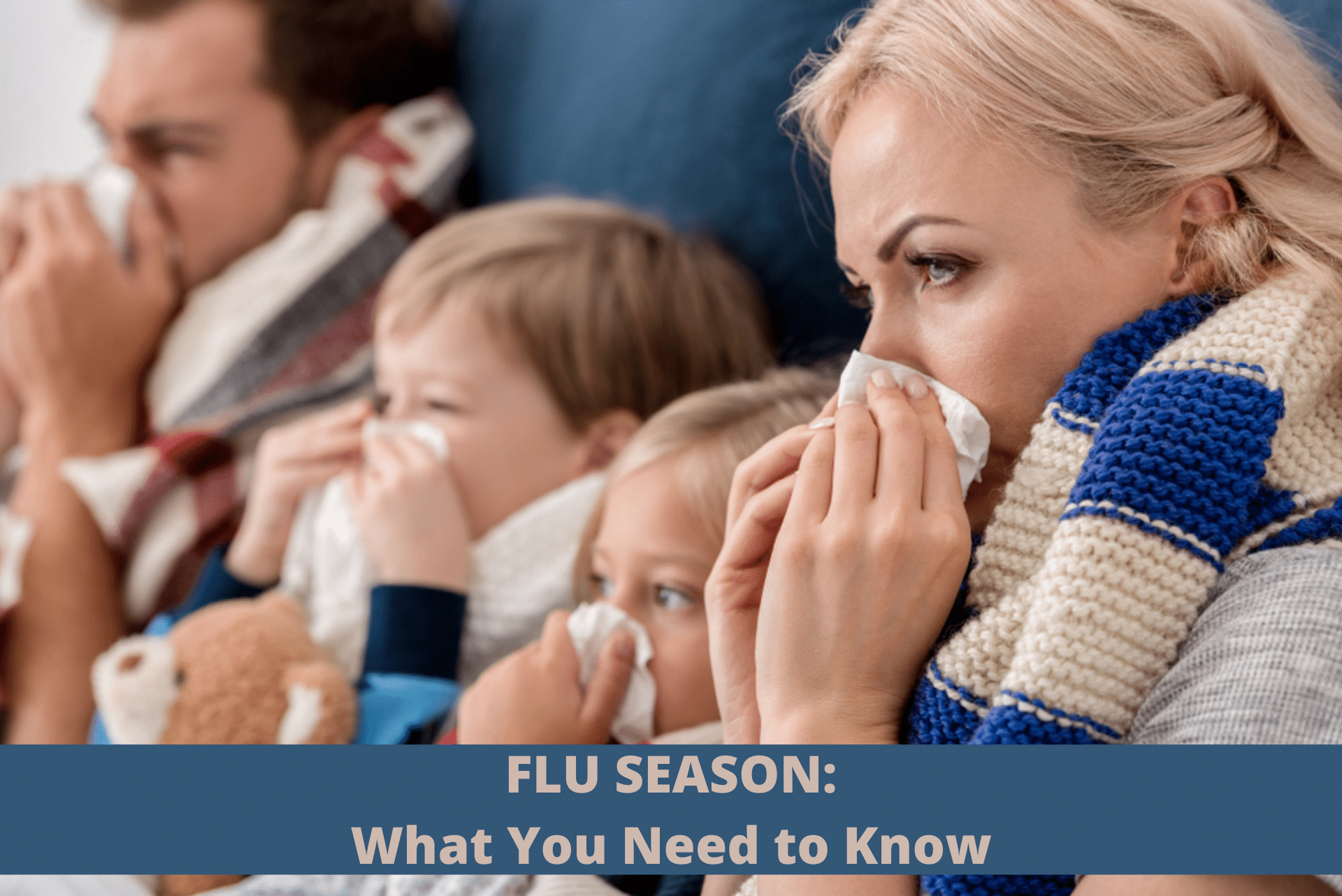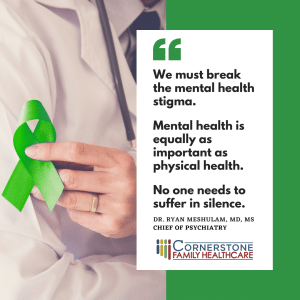Provider Blog by Dr. Angela Hulse, Medical Director
The flu season is coming. Like every year, getting the flu vaccination is the best way to help protect yourself and your loved ones. And with COVID-19, getting a flu vaccine is more important than ever to protect yourself, your family and your community from flu this year.
Wearing a face mask, keeping a safe distance from others, and regularly washing your hands with soap and water remains the best protection against the coronavirus, but there is a vaccine for the flu that greatly reduces your risk of infection.
The CDC recommends getting the flu shot as early as September. Flu shots are now available at Cornerstone Family Healthcare. Call (845) 563-8000 or visit our Urgent Care to get your flu shot today.
The Flu and COVID-19
Because of COVID-19, preventing the flu is more important than ever for a few reasons:
- Similar symptoms: COVID-19 and influenza are different viruses with similar symptoms — fever, chills, cough, sore throat, congestion, body aches and fatigue — which can make quickly diagnosing and treating someone more difficult. Getting both at the same time can also make it more difficult to recover.
- Symptoms that spread COVID-19: Some symptoms of flu can actually help spread COVID-19 by releasing droplets — namely congestion and cough. Continuing to follow the hygienic practices in place to prevent COVID-19 and getting a flu shot are the best ways to keep your entire family healthy.
- Chronic health conditions: The elderly and people with chronic health conditions such as heart disease, diabetes, and lung disease are at high risk for flu-related complications. They are also at high-risk for contracting COVID-19. Getting a flu vaccine has been shown to be the best protection against flu. In fact, it can reduce hospitalization in people with diabetes by up to 79%, according to the CDC.
- Risk of overwhelming healthy systems: In the 2018-19 flu season, about 49 percent of Americans received a flu vaccine, averting an estimated 4.4 million illnesses, 58,000 hospitalizations, and 3,500 deaths, according to the CDC. Experts hope more people will choose to get a flu shot this year to avoid over overwhelming our health systems, which may be dealing with a surge in COVID-19 cases this winter.
When is flu season?
Flu season typically begins in late fall, peaks in January and February, and may last until late spring. Ideally, flu vaccines should be administered before the onset of flu activity in a community -usually September to October.
What is the flu?
The flu (or influenza) is an extremely contagious virus that is known for causing a respiratory illness. Typically, the flu has a rapid onset and may cause symptoms, such as: fever, headache, muscle aches, and fatigue. In most cases, the flu causes a self-limited infection; meaning it will make you sick and uncomfortable, but your body will destroy the virus. However, the younger and older populations, pregnant women, or any other individuals with weakened immune systems, are considered to be “at risk” or “susceptible” populations; meaning that these patients may require medical treatment or even hospitalization in order to successfully combat the virus.
How is the flu spread?
The flu is spread from person to person via droplets from a cough, sneeze or while someone is talking. These droplets then spread to nearby people’s mouths or noses, and ultimately to their lungs where the virus replicates.
How long am I contagious if I have the flu?
Most individuals are contagious as early as one day prior to the development of symptoms and up to five to seven days after becoming ill. Keep in mind that this means you are infectious both before and while you are sick.
How can I prevent myself from getting the flu?
First and foremost, you should receive the flu vaccine! The Centers for Disease Control and Prevention (CDC) recommends the vaccine as the most important way to prevent yourself from contracting the flu. Additionally, take preventative precautions, such as: avoiding anyone who is sick, covering your mouth while sneezing/coughing, and washing your hands with soap and water.
When should I get the flu shot?
Ideally, these vaccines should be administered before the onset of flu activity in a community (usually September to October). However, the vaccine can be given at any point during the flu season – it’s never too late! So if you haven’t already received one this season, then please come in for a flu shot today.
Does the flu vaccine work right away?
No. It takes about two weeks after vaccination for antibodies to develop in the body and provide protection against influenza virus infection. That’s why it’s best to get vaccinated before influenza viruses start to spread in your community.
Can I still get the flu even if I get the flu vaccine?
Yes, but the severity will typically be not as bad. It may feel like a cold instead of being feverish and achy for days.
Who should receive the flu vaccine?
The Centers for Disease Control and Prevention recommends everyone over six months of age receive a routine seasonal flu vaccine, unless they have contraindications. Contraindications include: individuals who are allergic to eggs (anaphylaxis) and any individuals who had severe allergic reactions to previous flu vaccines. The vaccine is available in a variety of different formulations, and the doses and strengths are dependent upon your age and health.
So if I’m allergic to eggs, I can’t receive the flu shot?
People who have a history of egg allergies, including those who have hives, can safely receive the same vaccine as the general public. Those with history of severe egg allergy should discuss with their medical provider and can either get the flu vaccine in an observed setting or the egg-free flu vaccine.
Most flu shots and the nasal spray flu vaccine are manufactured using egg-based technology. Because of this, they contain a small amount of egg proteins. However, studies that have examined the use of both the nasal spray vaccine and flu shots in egg-allergic and non-egg-allergic patients indicate that severe allergic reactions in people with egg allergies are unlikely. A recent CDC study found the rate of anaphylaxis after all vaccines is 1.31 per one million vaccine doses given.
I received my flu shot last year. Why do I need it this year?
The flu virus changes each season, so even though you may have had the flu in the past, or have been vaccinated in previous years, you can get it again. The flu virus is constantly changing in order to adapt and survive. This process is called “drift,” and involves the virus mutating to form new strains of infectious particles. Each year, experts attempt to predict, which strains of the virus to include within vaccines.
This process is executed by identifying the strains of the virus that were most prevalent from the previous year. It is a challenging process, but it generally provides strong coverage against the flu. And even if it isn’t a perfect match, it has been known to lessen the severity of symptoms associated with other flu strains.
Are there any antibiotics that I can take for the flu?
No, unfortunately antibiotics will not work for the flu because the flu is a virus and not a bacteria. However, there is an anti-viral called TamiFlu (Oseltamivir) that can be given within the first 48 hours of symptom onset. TamiFlu can decrease the duration of symptoms by one to two days. This medication can help reduce the severity of the flu, and could potentially prevent hospitalizations in those individuals who have pre-existing health conditions. So if you begin to develop flu-like symptoms, then be sure to see your medical provider for evaluation because treatment is available.
Where can I get a flu shot?
Flu shots are now available at Cornerstone Family Healthcare. Call (845) 563-8000 or visit our Urgent Care to get your flu shot today.
If you are experiencing flu-like or COVID-19 symptoms call (845) 563-8000 before coming into the office. Our staff will help determine if you need to be seen and provide you with instructions for seeking medical care. If you are having a medical emergency, call 911.
Additional Information:
CDC Flu Facts – https://www.cdc.gov/flu/prevent/keyfacts.htm




